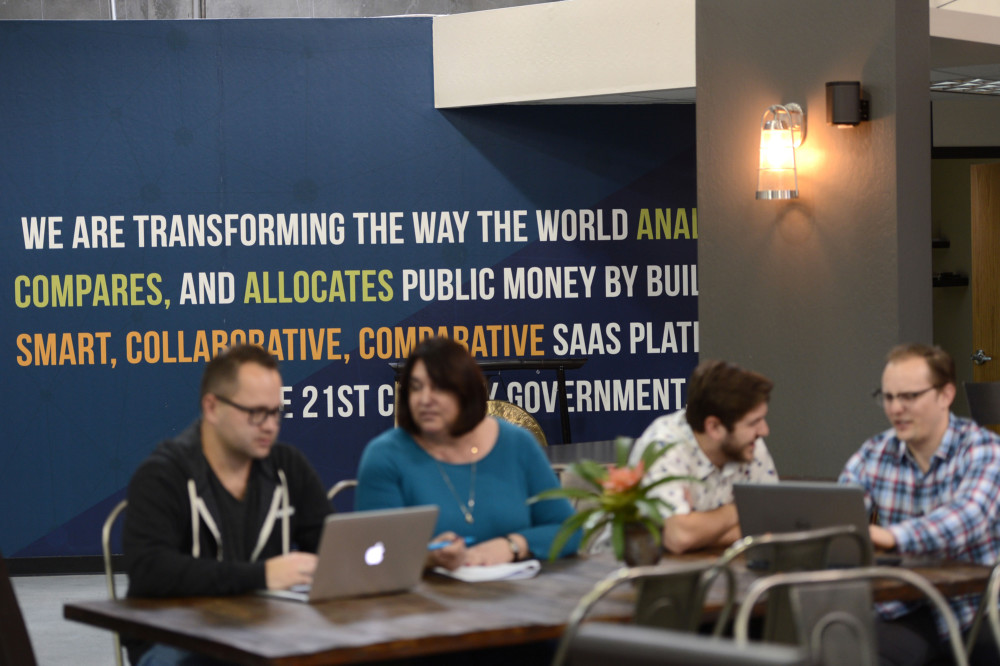By Marisa Kendall
The Mercury News
WWR Article Summary (tl;dr) As a wave of civic activism sweeps through the country, startups using technology to address issues of social justice, government accountability and health care have seen business boom since Trump’s election.
SAN JOSE, Calif.
Many Silicon Valley tech leaders continue to challenge the man they never wanted to see in the White House, labeling his ideas, particularly last month’s travel ban, as bad for the industry and their bottom line.
Meanwhile, for a few other tech companies, President Donald Trump is a goldmine.
As a wave of civic activism sweeps through the country, startups using technology to address issues of social justice, government accountability and health care have seen business boom since Trump’s election.
“A typical day before Trump was elected, we might have 5,000 or 10,000 unique users a day. Now we have roughly 100,000 to 200,000,” said Bart Myers, founder and CEO of Countable, an app that connects people with their congressional representatives.
“It’s a radical change. And it’s not slowing down.”
Startups like Countable and CrowdJustice, a crowdfunding platform for social justice lawsuits, are harnessing both the outrage and jubilation Americans are experiencing in the wake of the election, by giving users a way to speak out on divisive issues. Others, like birth control delivery app Nurx and immigration aid app Arrived.us, cater to users’ fears of what might happen under a Trump presidency.
Countable, which launched in 2014 and has offices in San Francisco and Washington, D.C., offers an app-based rundown of pending federal bills and helps users call or send electronic messages to their congressional representatives.
Countable sent more than 1 million messages to Congress over the past month, Myers said, and the Apple App Store recently featured it on one of its “Apps we love” lists. There’s been so much buzz around the app that Countable had to buy extra server space to handle the demand.
San Francisco resident Alexis Braren said she downloaded Countable after the election.
“I was just desperate to do anything _ literally anything,” said Braren, who was upset by Trump’s victory.
But the app can’t work magic. Braren says she’s used it to call U.S. Sen. Dianne Feinstein at least 10 times, and has never gotten through.
OpenGov, which sells software that helps local governments keep transparent financial records, also saw a Trump bump. The company is doing bigger deals, signing on clients like the California Natural Resources Agency, as more Americans express dissatisfaction with their elected officials, and local governments feel increasing pressure to be seen as “open.”
In addition to supercharging OpenGov’s business, the new administration also sparked a surge in job applications and investor interest. CEO Zachary Bookman estimates the company now sees 20 percent more job applicants, many of whom feel newly inspired after the election to work toward government accountability.
“Prospective employees and investors are kind of flocking to the business,” Bookman said, “and saying, ‘I want to be a part of this. I’m tired of photo sharing or mobile apps or mobile games. I want to do something important and meaningful.'”
Some startups have adjusted their business strategies to fully capitalize on the Trump presidency. CrowdJustice, a United Kingdom-based platform that lets users donate to public interest lawsuits, launched in the U.S. on Jan. 31, weeks ahead of schedule, to take advantage of Trump’s travel ban. The controversial ban, which temporarily blocked refugees and immigrants from seven predominantly Muslim countries from entering the U.S., remains suspended following a Feb. 9 order from the 9th Circuit Court of Appeals.
CrowdJustice kicked off its United States presence with a Virginia lawsuit filed against Trump by two Yemeni brothers who were briefly denied entry into the U.S. under the ban. The campaign raised $36,600 in five days, more than twice its $15,000 goal.
San Francisco-based Nurx recently began marketing to women who are worried their birth control options will be limited under new Trump-era health care policies. The startup, which provides on-demand delivery of birth control pills without a doctor’s visit, has offered free pill packs with the promotional codes “TinyHands” and “AlternativeFacts”, both jabs at the Trump administration.
“We’ve seen a lot of new interest since the election,” said Nurx co-founder Hans Gangeskar.
Trump and the Republican-controlled Congress have promised to repeal former President Barack Obama’s Affordable Care Act, which requires insurers to cover birth control with no copay. That means birth control may become more expensive under Trump, and Gangeskar said women are turning to Nurx to ask questions and stock up on extra pills, just in case.
The startup offers pills for as low as $15 a month without insurance.
Trump’s agenda also spells promise for Arrived.us, an app for immigrants that Google employees William McLaughlin and Eduardo Gaitan launched as a side project in July. The app maps out immigration nonprofits, law clinics and sanctuary cities throughout the U.S., and provides information on topics such as visas, deportation and English classes.
Its user base is still small, but after Trump signed the travel ban late last month, the app saw a flurry of interest and now is approaching 1,000 users.
“I don’t think anyone could have foreseen it,” McLaughlin said. “So we’re really excited about it.”














































































































































































































































































































































































